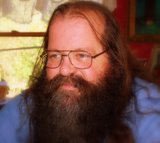By John M Morris, Ph.D.
I was introduced to Zen Buddhism as a theological student in Berkeley, California, many years ago. Since then I've drifted into Inca Shamanism, Starhawk's eclectic witchcraft, trance drumming, and much else, but I've recently returned to Zen as a way of discovering a deeper spirit than anything found in the doctrinal religions.
My first teacher in Zen was Alan Watts, in San Francisco, whose radio addresses on KPFA, his classes, and his lectures at the Church for the Fellowship of All Peoples opened the door to a new way of defining a non doctrinal formm of religious practices.
Watts, a former Anglican priest, had his own take on Zen, making it muuch more attractive to most of us than a complex Oriental curiosity.
Not far away there was another huge church with thousands of people shouting "amen" to a relevant sermon.
Zen is much quieter, of course. We are invited to meditate in silence, blocking out the noise and confusion around us. Zen invites us to ignore theology, those doctrines that divide us, and to come to terms with the vast emptiness at the heart of this churning world.
I remember at one time, when I was studying for a doctorate in philosophy, wondering at the way in which a philosophical puzzle could breed hundreds of pages of charges and counter-charges, leaving the original problem unsolved. Surely the many religious disputes going on around us are no better. "Does a dog have Buddhia nature?" Answer: "Woof woof."
Intense meditation has the effect of clearing the mind. Eventually there comes the moment of satori, a moment when our day-to-day problems are not solved but are left behind. As one great mystic, William Blake, put it, "When the doors of perception are cleansed, we shall see everything as it is, infinite." Or my favorite, Walt Whitman: "When I heard the learn'd astronomer" with his many calculations, I left the lecture hall and "looked with simple silence at the stars."
Like Thoreau, who wanted to "settle myself, and sink my feet downward, through the mud and slush of time" until he finds solid earth under his feet, and can say "this is reality and no mistake," Zen is looking for the reality that lies under the mud and slush of ordinary perception. But for the Zen master, Thoreau is perhaps as far as any of us from discovering the reality of this world.
When you read a collection of Zen meditations, you may find it confusing, since there is no doctrine here, no set of "teachings." For the Zen student is alone in the world. Each person is a seeker. It is that constant seeking for a truth that is before your eyes that makes Zen a companion for your journey that goes deeper and deeper into reality that we can find only for ourselves, but only as the seeking is something that we undertake with full commitment. Zen is not for a lazy person.
Unlike many religious traditions, Zen has no doctrine, no rules, no specific practices. Instead it is a way of goiing beyond all rigid belief systems, coming to terms with their underlying reality.
One way of clearning the mind of its thousand distractions is the koan, a simple riddle or story that has no real answer. "If two hands clapping make a slapping sound, what does one hand clapping sound like?" Of course there is no answer, and that is the point. Most of our philosophical and religious problems are those with no answers that make any sense.
Tuesday, December 11, 2007
The Yen for Zen
Subscribe to:
Post Comments (Atom)





No comments:
Post a Comment